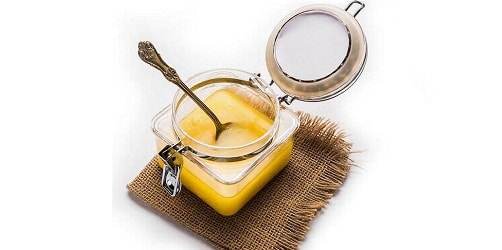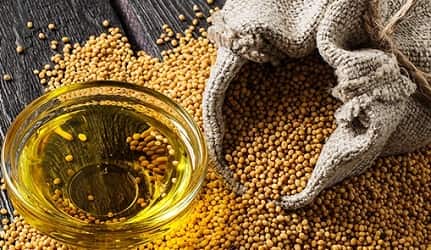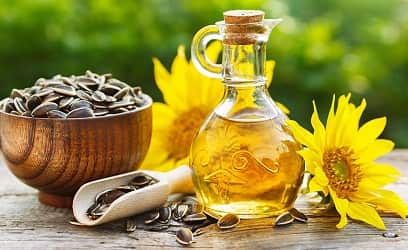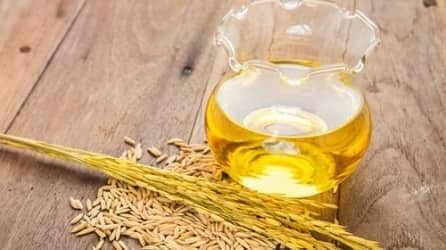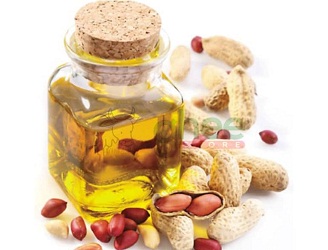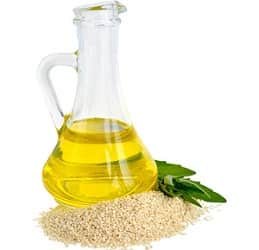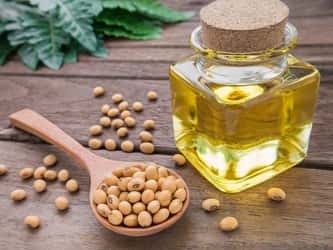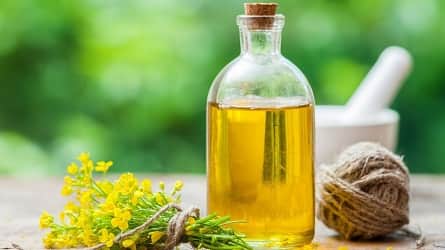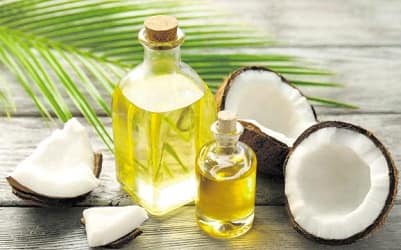Many of us when we try to lose weight the first change that we do in our eating habit is cut down fats. We believe reducing fat intake with our daily meals will help us lose weight, this is not entirely true. Just like proteins, carbohydrates, vitamins, and minerals, our bodies require fats to function properly.
Following a no-fat diet or low-fat diet may not give you an effective result. Fats are an essential component of a balanced diet to stay fit and healthy. Consuming fats in the proper proportion will help in weight loss. One thing we need to remember is what kind of fat to consume and how it affects our health. Prefer healthy fats like olive oil in your cooking, olive oil helps in breaking down the fats properly and thereby help in staying healthy.
Cooking oil is an essential part of Indian Kitchen; it affects the taste, texture, and color of the food. From tadka to yummy samosas and parathas oil is used daily in every single meal. But picking the right kind of cooking oil is important to avoid heart disease and promote a healthier lifestyle.
Through this article, we will be discussing all the things one has to know about the best cooking oil available in the market. Pick the one that suits your needs and lifestyle that helps you stay fit while enjoying delicious meals.
Table of Contents
Learner’s guide to cooking oil
Before we start discussing which oil is good or bad for health, let’s understand the meaning of cooking oil. Cooking oils are available in different options. Each of these oil varies in color, texture, and taste. Knowing the types of cooking oil, their difference and quality will help us make a better decision in choosing one.
What is cooking oil?
Cooking oil is a liquid form of fat that is widely used in fried food and other Indian cooking. The oil that we use for cooking is extracted from different types of plants, nuts, and seeds. For example, coconut oil is derived from coconuts.
For the extraction of coconut oil, the white part is mashed up with the help of the giant machine. The spinning helps in separation of oil present in coconut, the oil so extracted is further filtered and purified before used in cooking.
Similarly, one gets groundnut oil from groundnuts, olive oil from olives, etc.
Different types of cooking oil
Cooking oil is available in three different types of fats, namely, saturated, monounsaturated, and polyunsaturated fats. The ratio of these fats in some cooking oil is more and less in others. The presence of fats determines who a particular type of cooking oil behaves when exposed to heat.
Monounsaturated fats remain liquid at room temperature. Olive oil contains Monounsaturated fat in abundance, making it healthy.
Monounsaturated fats are more stable than polyunsaturated fats. On the other hand, polyunsaturated fats are plant-based oils. This type of oil is less stable when exposed to heat. They must be consumed in small quantities as part of our diet to avoid health issues.
Finally, the third type of cooking oil is saturated oil. Saturated fats in plant oil and animal oil are essential for the diet. Consuming saturated fat has various benefits such as an increase in good cholesterol, improving blood pressure, etc.
How does different cooking oil react to heat?
When we talk about how cooking oil reacts to heat, it mainly depends on the type of carbon bond. A molecule with a higher carbon bond is highly sensitive to heat. This is the reason why poly-unsaturated fats that contain at least two carbon bonds are not ideal for cooking.
Whereas saturated and mono-unsaturated has one or zero-carbon bond and making it a great choice for cooking. Coconut oil is a good example of saturated fat; coconut oil has high resistance to temperature and hence can be used for high-heat cooking.
Equally one can also use mono-unsaturated fat for cooking; these fats are known to be healthy for the functioning of the heart. Mono fats reduce heart diseases by increasing good cholesterol in the body.
The quality of the cooking oil
The quality of the cooking oil that you purchase affects the taste and texture of the food. Purchasing high-quality cooking oil is essential for the health of a person. These days one can find fake cooking oil are available in the market. The quality of cooking oil can be determined from the color, government seal and texture of the oil.
Keep these points in mind while purchasing cooking oil; choose a brand and type that promotes your health. Staying fit and healthy is the need of time, making slight changes in our cooking habits will go a long way.
Best Cooking Oils Available In India
The number of options and brands in the market that sell cooking oil can be overwhelming to make a decision. For new cooks and first-time purchasers, the decision of choosing the right kind of cooking oil can be tough. Hence to help you make a decision, here is a list of top ten cooking oil that is suitable for Indian cooking and taste.
Consider the list, learn their pros and cons and pick an oil that suits the needs and likes of our lifestyle.
1. Ghee
The traditional Indian cooking uses Ghee as their fats. Ghee is clarified butter that has various health benefits. Consuming Ghee is considered as a healthier option while cooking.
Pros of cooking with Ghee:
- Eating ghee regularly increases one’s immunity to fight against seasonal allergies and other common health issues.
- Ghee is said to stimulate digestion in a body, it helps secrete stomach acids and increases digestion than other fats.
- The most important benefit of consuming ghee is that it reduces bad cholesterol in the body and enhances good cholesterol. This reduces heart diseases in a person.
- Ghee being the best form of fat boosts fertility in a person. It helps increase the quality and quantity of semen in a person.
- Women should consume a small dose of ghee regularly, as it helps rejuvenate the skin from inside the body. A rejuvenated skin increases the glow and helps look pretty.
Cons of cooking with Ghee:
Just like all other things Ghee do have side effects, some of them are as follows:
- Consuming ghee is helpful for pregnant women just before labor pain. But the same ghee can prove to be harmful if consumed at the beginning stages of pregnancy.
- Like all other food, ghee should be included in our diet in small quantities. Overconsumption of ghee can lead to indigestion and diarrhea. Ghee is heavy food and it must be consumed only in small portions to reap its benefits.
- People suffering from cough or cold should avoid eating ghee. Consuming ghee when suffering from these aliments can increase its effects on the body.
- Ghee should never be consumed without heating it. Ghee when heated kills bacteria and other microbes present in the substance and make it healthy.
- Finally avoid mixing Ghee with honey, as this combination is not good for the proper functioning of the body.
2. Mustard Oil
The next cooking oil in our list is mustard; again this type of cooking oil is widely used in traditional Indian cuisine. Mustard oil can be found in a majority of Indian kitchens, this is highly preferred for its health characteristics like immunity booster, etc.
Pros of cooking with Mustard oil:
- Mustard oil is packed with Vitamin E, an important component that helps in protecting the skin. Consuming vitamin E helps in keeping our skin healthy, it reduces the aging of the skin and prevents cancer by blocking UV rays.
- The properties of mustard oil are very beneficial for the healing process. It is used for treating skin related like rashes, itchy, dry skin and infection. The anti-inflammatory and fungal properties of mustard oil are the main reason for using it in treatments.
- Additionally, mustard oil has various hair benefits. It is said to prevent hair fall and premature graying of hair.
- Mustard oil is a natural stimulant when consumed it helps the digestive, circulative and excretory systems to react. Mustard oil increases blood circulation and helps stay active.
Cons of cooking with mustard oil:
Every good thing come with some negative effects, similarly, the disadvantage of using mustard oil is as follows:
- It can result in a minor allergy reaction for some people.
- Some users of mustard oil have complained about an increase in inflammation of sinus that resulted in sneezing, coughing and runny nose.
- Mustard contains erucic acid that can pose some serious health issues in a person.
- Mustard oil increases the risk of dropsy.
3. Sunflower Oil
Sunflower oil is obtained from the seeds of sunflowers. Sunflower oil is a mixture of both mono and polyunsaturated fats. Sunflower oil has a high smoking point; this means you can use sunflower oil for deep frying of food. Sunflower oil holds on to its nutrient content present in it even under higher temperatures.
Pros of cooking with sunflower oil:
- The first benefit of cooking with sunflower oil is that it is rich in vitamin E. The presence of vitamin E makes the oil behave like anti-oxidant and helps increase immunity in the body.
- Vitamin E also helps nourish the skin of a person. Vitamin E protects our skin from sun damage and helps it stay healthy. It heals scars and wounds quickly and increases the glow of the sink.
- Sunflower oil is a natural conditioner for hair. Applying sunflower oil to the scalp prevents dryness and frizzy.
- The unsaturated fat present in the sunflower oil makes the liver give out glycogen and increases one’s energy level.
Cons of cooking with sunflower oil:
- Sunflower oil is rich in omega 6 fatty acids, which our body requires. But the high consumption of fatty acids can increase health problems.
- Sunflower generates a high amount of aldehydes which is not good for health.
4. Olive Oil
Olive oil is obtained from olives; it is highly used in Mediterranean cooking. Olive oil contains monounsaturated fats that are beneficial for health.
Pros of cooking with olive oil:
- The foremost pro of using olive oil in cooking is that it reduces bad cholesterol in the body. It protects the consumer from heart diseases.
- The anti-oxidant and anti-inflammation properties of olive oil are important reasons for heart health
- Consumption of olive oil can also reduce the different types of cancer in the body such as colon, breast and skin cancer.
- The health benefit of olive oil also includes the health of the stomach. It reduces infection in the stomach that affects ulcers and gastritis.
- The anti-oxidants property of olive oil is very beneficial for the skin and it reduces the aging process and keeps it nourished.
Cons of cooking with olive oil:
- The disadvantage of using olive oil can be associated with the presence of saturated and unsaturated fat. 77 fatty acid of olive oil can hinder blood circulation and it is responsible for blood thickening and free flow.
- The overconsumption of olive oil increases calories in the body. This can lead to an increase in weight. Hence consume olive oil at a moderate level to enjoy its benefits and keep additional pounds away.
5. Rice Bran oil
The next cooking oil on our list is rice bran oil. It is made from the bran (outer layer) of the rice. This type of cooking oil is gaining its popularity among consumers and manufacturers fast. Using rice bran in cooking doesn’t affect the taste of Indian dishes, making it a great choice.
Pros of cooking with rice bran oil:
- Consumption of rice bran oil is high resistance to temperature and can be used in deep frying of food.
- Rice bran oil contains balanced fatty acids and it is free from trans-fats. Cooking with rice bran oil help reduce weight.
- The oryzanol present in rice bran oil lowers the cholesterol content when consumed in the right amount. It helps eliminate bad cholesterol by reducing its absorption by the body.
- Rice bran oil boosts metabolism rate in the body, which is essential to stay fit and active.
Con’s of cooking with rice bran oil:
- Tough the rice bran oil has a neutral taste, consuming it for the first time can cause stomach discomfort and gas formation.
- Rice bran oil cannot be cold-pressed when extracted. Industries use heat and chemicals to extract the oil; thereby it may lose some of its natural nutrients.
6. Groundnut Oil
Groundnut oil comes from the peanuts. Most Indians prefer cooking with ground oil for it helps retain the taste and texture of the food. Groundnut oil contains a high amount of monounsaturated and polyunsaturated fats.
Pros of cooking with groundnut oil:
- One single spoon of ground oil contains 11 percent of recommended vitamin E intake. Vitamin E is a fat-soluble compound; its consumption will lead to various health benefits.
- The high levels of unsaturated fats acids are beneficial for the body, mainly to the heart. Studies have shown that increasing the intake of unsaturated fats could reduce the risk of heart ailments. Groundnut oil is rich in both mono and polyunsaturated fats.
- Groundnut oil is again beneficial for the skin. People suffering from dry skin and other related skin problems can apply medicine containing groundnut oil.
- Old age can lead to arthritis and joint pains. It is considered that applying and groundnut oil to the arms and limbs along with its consumption can help relieve the pain.
Con’s of cooking with groundnut oil:
- Eating groundnut oil in a small portion is recommended. But increased consumption of groundnut oil must be avoided by pregnant and breastfeeding women.
- People suffering from groundnut allegories should avoid consuming groundnut oil as its consumption can lead to serious reactions.
7. Sesame oil
Sesame oil is a type of vegetable oil that is in use from ancient times. People belonging to India, China, and central Asia use sesame oil. Cooking with sesame oil three to four times a week is recommended.
Pros of cooking with sesame oil:
- The high amount of vitamins and other minerals present in the sesame oil is important for the healthy, development and nourishment of the skin. The vitamins present in the oil are also useful for the health of the hair in a person.
- Sesame oil is to reduce inflammation in the body and fights other radicals. Cooking food in sesame oil is shown to reduce the risk of developing cancer and heart problems.
- Sesame oil is an antidepressant remedy, it relieves apathy and insomnia.
- The best part of cooking with sesame oil is that it can be consumed by women who are pregnant or breastfeeding.
Cons of cooking with sesame oil:
- Sesame oil consumption should be avoided by the people who are intolerant towards it.
- Consumption of food cooked with sesame oil daily can increase the calorie count in a person. It must be used sparingly for its health benefits.
8. Soybean oil
Soybean is one of the important sources of protein that is available for vegetarians and vegans. Soybean oil comes from the soybean, which is used by many in cooking around the world. The popularity of soybean has reached the Indian market and today we see Indian cooking with soybean oil.
Pros of cooking with soybean oil:
- Soybean oil is rich in vitamin K that helps fight Alzheimer’s. It also helps keep the brain and body protected from radical damage.
- Hair loss is a common complaint among men and women these days. Cooking with soybean oil can reduce hair loss and support healthy hair growth.
- Soybean contains polyphenol, a plant-derived compound that is similar to estrogen in its function. Estrogen is required for the growth and strength of the bones.
- The omega – 3 fatty acids help protect the cell membrane around the eye prevents the entry of microbes and protects vision.
- Anemia is a common problem among people that do not consume meat. Anemia is mainly due to iron deficiency. Soybean oil contains iron which can supplement the deficiency in the body.
- Regular consumption of soybean oil stimulates the body’s metabolism and regulates the internal clock thereby fighting sleep disorders in a person.
Cons of cooking with soybean oil:
- Consumption of food cooked in soybean oil can contribute to harmful diseases like obesity and diabetics.
- Soybean oil contains polyunsaturated fat that can oxidize easily at high temperatures. Hence avoid using soybean oil for deep frying of food.
- Regular soybean oil consumption can lead to hormonal imbalance.
9. Canola Oil
Canola oil is a very recent addition to the Indian market. Canola oil is one of the healthiest options to be used in cooking. The bottles of canola oil are flying off the shelves in the Indian market.
Pros of cooking with Canola Oil:
- Researchers believe that monounsaturated fat present in canola oil help reduce abdominal fat and can be included as a part of a healthy diet.
- The use of canola oil is beneficial for people suffering from obesity and diabetics which in return results in heart diseases.
- The expert through their research has shown that canola oil usage reduced blood glucose levels and bad cholesterol in the body.
- Canola oil improves immune function in a body and promotes the health of a brain.
Cons of cooking with Canola Oil:
- Canola oil is a low smoking point and should be used for deep frying of food. Canola oil is good for sauteing and moderate temperature cooking.
- Omega 6 fatty acid that is present in canola oil is beneficial only when consumed in small quantities. Excessive consumption can be counterproductive.
10. Edible coconut oil
Coconut oil comes from coconuts that are widely used by the people living in the coastal and tropical regions. Coconut oil influences the taste of food when used in deep frying.
Pros of cooking with Coconut Oil:
- Coconut oil is rich in anti-oxidants, an essential element for the health of skin and hair in a person.
- For inhabitants of islands, coconut oil consumption can reduce heart problems.
- The MTC present in coconut oil can help fight epilepsy and Alzheimer’s
- Coconut oil consumption can boost HDL levels in the body that is good for the health of the heart.
Cons of cooking with Coconut Oil:
- The main drawback of cooking with coconut oil is the fat content present in it. If you are planning to lose weight avoid cooking in coconut oil.
Conclusion
Cooking oil is no doubt an important component of making a dish. Irrespective of what media says no cooking oil is 100 percent healthy. Do intense research and understand the effects of using particular oil on your body. Choose cooking oil that is right for your nutrition needs and lifestyle.
Most of the above-mentioned list of cooking oil has health benefits, but remember to use them in small portions and occasionally for enjoying their health benefits.
